“The hum of conversation and the clinking of spoons and coffee cups fills the wood-panelled cafe in a fashionable Tokyo neighborhood as more than a dozen customers sip drinks and nibble desserts. At first glance, the cafe, which also serves alcohol, looks like any other except for an altar next to the countertop bar with a Buddha statue set against a gold backdrop. Its name, Tera Cafe, is a another hint – Tera is Japanese for temple. The menu confirms this is something different. It lists classes for 1,500 yen ($14) in weaving prayer beads, calligraphy with sutras, or lines of scripture, and consultations with a Buddhist priest. Tera Cafe is part of a flourishing phenomenon in Japan where Buddhist monks are seeking to make inroads in the modern world as the public’s connection with a 15-century-old tradition fades. Gone are the days when the faithful would drop by their neighborhood temple to talk to a monk over tea.
Famously areligious, many Japanese observe rituals from different traditions, perhaps going for a church wedding and worshipping at a Shinto shrine at the New Year. Buddhism is associated with funerals. Hirotake Asano, head priest at the Shingyoji temple near Tokyo who opened Tera Cafe in 2013, said Buddhist priests had to venture into society to build links. “Instead of lamenting that people no longer visit temples, I wanted to bring the temple to the people”, said Asano, who owns four restaurants and a golf shop. His businesses underscore the need for Buddhist monks to find a livelihood outside the temple. Many sects of Japanese Buddhism allow priests to drink alcohol, eat meat, and marry. As well as the alcoholic drinks Tera Cafe offers shabu-shabu pork and ginger-flavored chicken. Business appears to be brisk. On a recent visit, women in their 20s to 40s – the cafe’s main clientele – took up most of the dozen or so tables. And the interest in Buddhism? “That’s difficult to measure”, said Shokyo Miura, one of about 10 monks who take turns as an on-site priest. “We get 70 to 80 people a month signing up for classes or consultations, but the number does shrink if we’re talking about people who actually want to learn about Buddhist teachings”. – Yiyuan Wang via Reuters
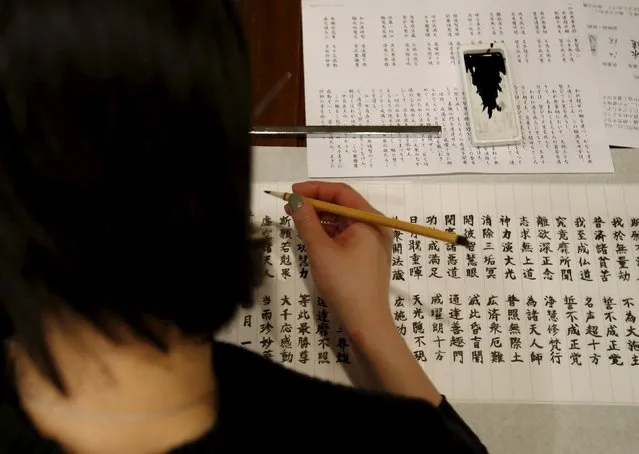
A visitor traces Buddhist sutras with a brush at Tera Cafe in Tokyo, Japan, April 1, 2016. (Photo by Yuya Shino/Reuters)
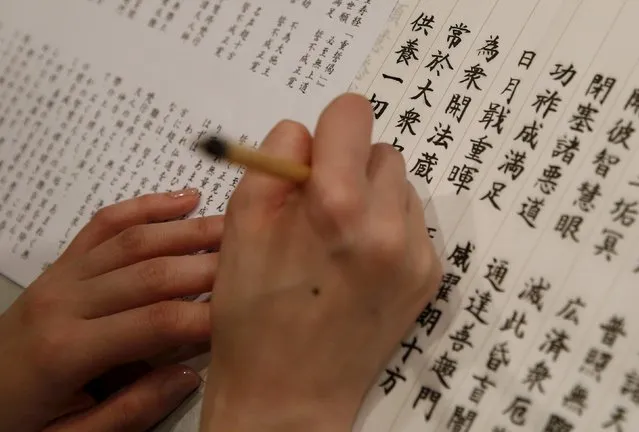
A visitor traces Buddhist sutras with a brush at Tera Cafe in Tokyo, Japan, April 1, 2016. (Photo by Yuya Shino/Reuters)
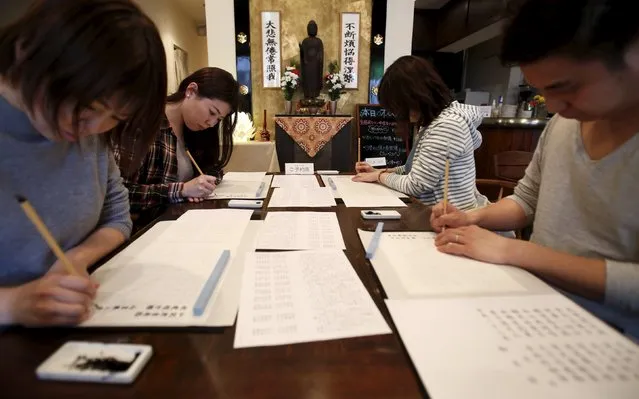
People trace Buddhist sutras with brushes at Tera Cafe in Tokyo, Japan, April 1, 2016. (Photo by Yuya Shino/Reuters)
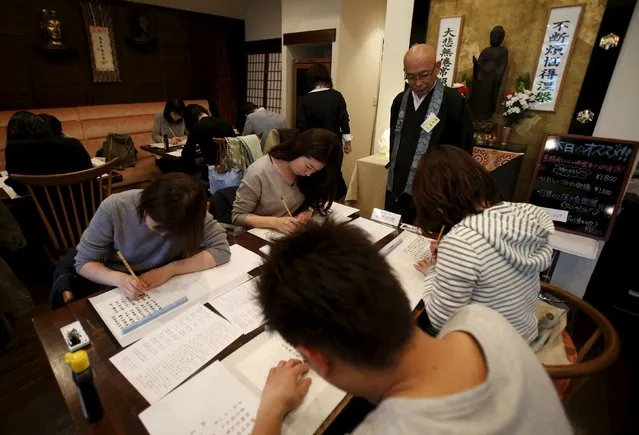
People trace Buddhist sutras with brushes at Tera Cafe in Tokyo, Japan, April 1, 2016. (Photo by Yuya Shino/Reuters)
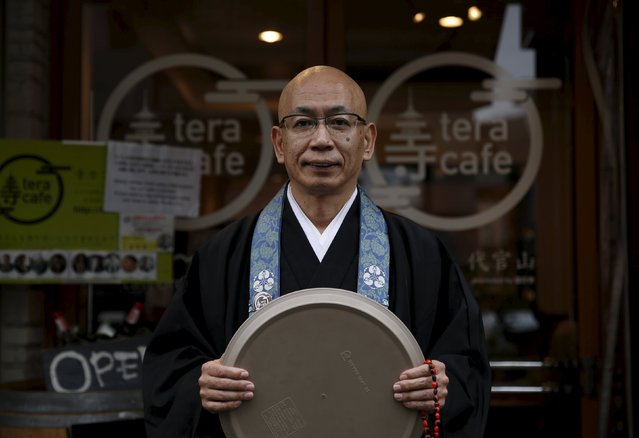
Shokyo Miura, a Buddhist monk and one of the on-site priests, poses for pictures outside Tera Cafe in Tokyo, Japan, April 1, 2016. (Photo by Yuya Shino/Reuters)
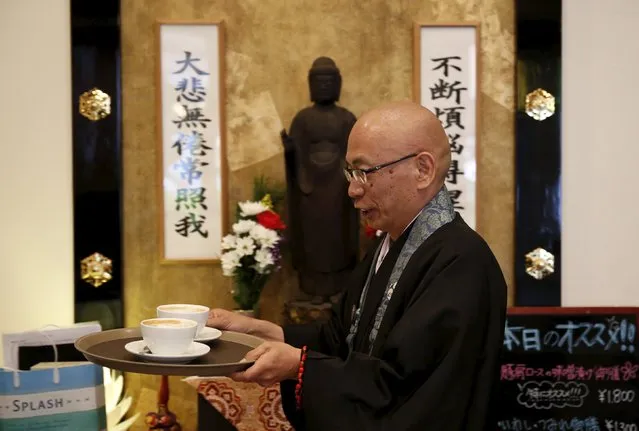
Shokyo Miura, a Buddhist monk and one of the on-site priests, carries cups of coffee past a statue of Buddha at Tera Cafe in Tokyo, Japan, April 1, 2016. (Photo by Yuya Shino/Reuters)
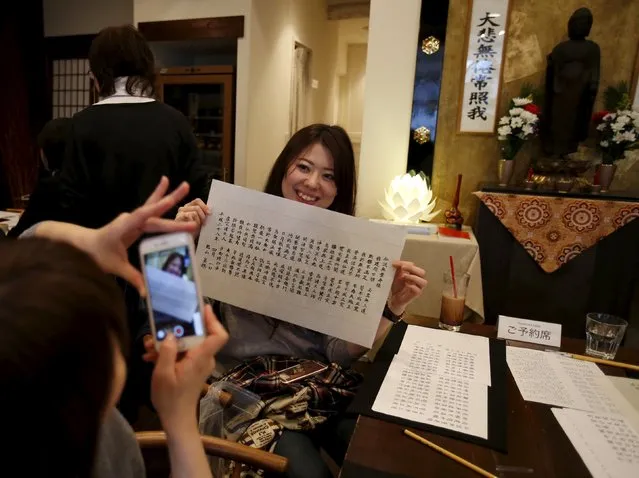
A woman poses for pictures while holding a piece of calligraphy with Buddhist sutras at Tera Cafe in Tokyo, Japan, April 1, 2016. (Photo by Yuya Shino/Reuters)
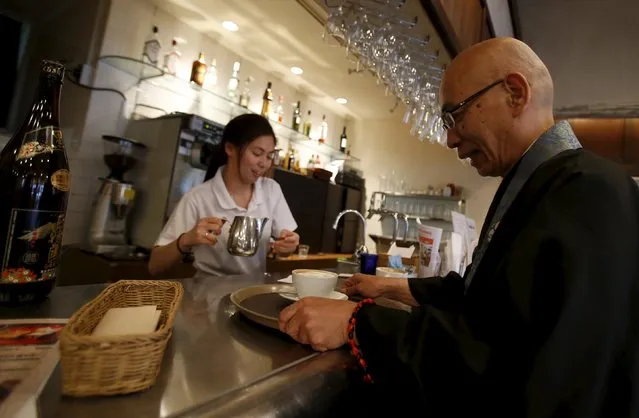
Shokyo Miura, a Buddhist monk and one of the on-site priests, carries a cup of coffee in front of a bar counter at Tera Cafe in Tokyo, Japan, April 1, 2016. (Photo by Yuya Shino/Reuters)
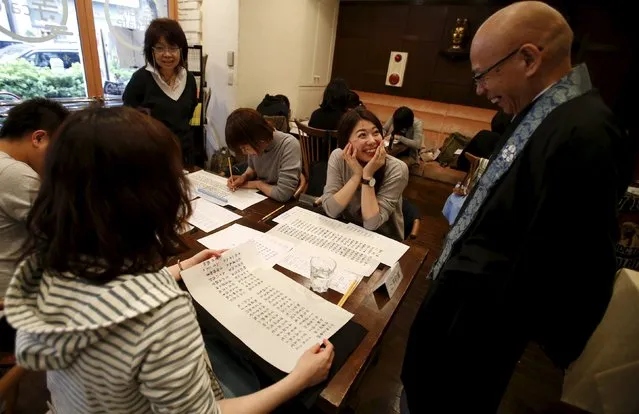
A woman speaks to Shokyo Miura, a Buddhist monk and one of the on-site priests, after tracing Buddhist sutras at Tera Cafe in Tokyo, Japan, April 1, 2016. (Photo by Yuya Shino/Reuters)
Famously areligious, many Japanese observe rituals from different traditions, perhaps going for a church wedding and worshipping at a Shinto shrine at the New Year. Buddhism is associated with funerals. Hirotake Asano, head priest at the Shingyoji temple near Tokyo who opened Tera Cafe in 2013, said Buddhist priests had to venture into society to build links. “Instead of lamenting that people no longer visit temples, I wanted to bring the temple to the people”, said Asano, who owns four restaurants and a golf shop. His businesses underscore the need for Buddhist monks to find a livelihood outside the temple. Many sects of Japanese Buddhism allow priests to drink alcohol, eat meat, and marry. As well as the alcoholic drinks Tera Cafe offers shabu-shabu pork and ginger-flavored chicken. Business appears to be brisk. On a recent visit, women in their 20s to 40s – the cafe’s main clientele – took up most of the dozen or so tables. And the interest in Buddhism? “That’s difficult to measure”, said Shokyo Miura, one of about 10 monks who take turns as an on-site priest. “We get 70 to 80 people a month signing up for classes or consultations, but the number does shrink if we’re talking about people who actually want to learn about Buddhist teachings”. – Yiyuan Wang via Reuters

A visitor traces Buddhist sutras with a brush at Tera Cafe in Tokyo, Japan, April 1, 2016. (Photo by Yuya Shino/Reuters)

A visitor traces Buddhist sutras with a brush at Tera Cafe in Tokyo, Japan, April 1, 2016. (Photo by Yuya Shino/Reuters)

People trace Buddhist sutras with brushes at Tera Cafe in Tokyo, Japan, April 1, 2016. (Photo by Yuya Shino/Reuters)

People trace Buddhist sutras with brushes at Tera Cafe in Tokyo, Japan, April 1, 2016. (Photo by Yuya Shino/Reuters)

Shokyo Miura, a Buddhist monk and one of the on-site priests, poses for pictures outside Tera Cafe in Tokyo, Japan, April 1, 2016. (Photo by Yuya Shino/Reuters)

Shokyo Miura, a Buddhist monk and one of the on-site priests, carries cups of coffee past a statue of Buddha at Tera Cafe in Tokyo, Japan, April 1, 2016. (Photo by Yuya Shino/Reuters)

A woman poses for pictures while holding a piece of calligraphy with Buddhist sutras at Tera Cafe in Tokyo, Japan, April 1, 2016. (Photo by Yuya Shino/Reuters)

Shokyo Miura, a Buddhist monk and one of the on-site priests, carries a cup of coffee in front of a bar counter at Tera Cafe in Tokyo, Japan, April 1, 2016. (Photo by Yuya Shino/Reuters)

A woman speaks to Shokyo Miura, a Buddhist monk and one of the on-site priests, after tracing Buddhist sutras at Tera Cafe in Tokyo, Japan, April 1, 2016. (Photo by Yuya Shino/Reuters)
09 Apr 2016 13:21:00,
post received
0 comments
